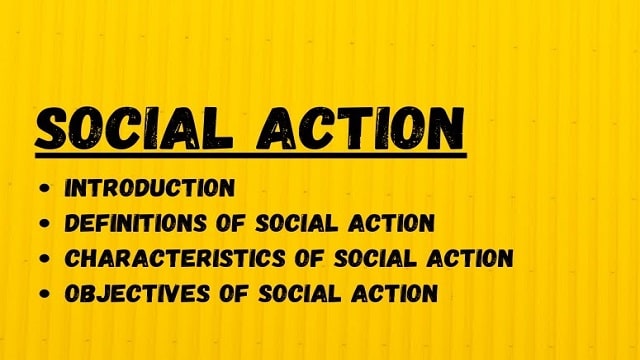Social Action Meaning
Social action is any human behavior that is carried out to meet the expectations of others (for example, buying a gift for another person to enjoy, helping someone in need) or responding to the behavior of others, or to obtain those responses (for example, attacking someone who insults me, thanking someone for a kind gesture, paying when they sell me something).
For example, praying in private, dreaming, shouting when the team you admire scores a goal, getting excited about a memory, accumulating money, etc., are not social actions.
The German sociologist Max Weber (1864-1920) distinguished between individual and social actions, which he defined as those human behaviors (also tolerances or omissions) that are intentional, with a meaning oriented by and for others, and these are the object of the study of Sociology. For this author, those actions of others that determine one’s own behavior, or vice versa, can be current, past or future expectations, such as revenge for a previous act.
Social action is directed towards another or others even when they are not physically present, for example, dressing up to please a boy you are about to meet.
Every social action involves a context, material or immaterial instruments that make it possible to develop it, and a purpose.
According to Max Weber, there are four ideal models of social action that emerge progressively, due to their increasing rational complexity.
1. Social action based on custom or tradition, where a man acts by external imposition and not by rational analysis of why he does it, or why he does it, for example, greeting acquaintances or dressing fashionably.
2. Social action is determined by emotions, also called affective behavior, where reason does not fully intervene, but rather emotions, but it is separated from the impositions of custom: yelling at someone when we are angry, kissing them when we feel affection, etc.
3. Rational social action, with moral values, but without the pursuit of specific ends. Actions are determined by moral or religious norms, for example donating one’s property to those in need.
4. Social actions that pursue a rational end, seeking appropriate means to achieve it, for example, scientifically studying a drug to cure diseases.
Social Action Meaning in Hindi
सामाजिक क्रिया वह मानवीय व्यवहार है जो दूसरों की अपेक्षाओं को पूरा करने के लिए किया जाता है (उदाहरण के लिए, किसी दूसरे व्यक्ति के लिए उपहार खरीदना, किसी ज़रूरतमंद की मदद करना) या दूसरों के व्यवहार पर प्रतिक्रिया करना, या उन प्रतिक्रियाओं को प्राप्त करना (उदाहरण के लिए, किसी ऐसे व्यक्ति पर हमला करना जो मेरा अपमान करता है, किसी दयालु इशारे के लिए किसी का धन्यवाद करना, जब वे मुझे कुछ बेचते हैं तो भुगतान करना)।
उदाहरण के लिए, अकेले में प्रार्थना करना, सपने देखना, जब आपकी प्रशंसा करने वाली टीम गोल करती है तो चिल्लाना, किसी याद को लेकर उत्साहित होना, पैसा इकट्ठा करना आदि, सामाजिक क्रियाएँ नहीं हैं।
जर्मन समाजशास्त्री मैक्स वेबर (1864-1920) ने व्यक्तिगत और सामाजिक क्रियाओं के बीच अंतर किया, जिसे उन्होंने उन मानवीय व्यवहारों (सहनशीलता या चूक भी) के रूप में परिभाषित किया जो जानबूझकर किए जाते हैं, जिनका अर्थ दूसरों द्वारा और दूसरों के लिए उन्मुख होता है, और ये समाजशास्त्र के अध्ययन का विषय हैं। इस लेखक के लिए, दूसरों की वे क्रियाएँ जो किसी के अपने व्यवहार को निर्धारित करती हैं, या इसके विपरीत, वर्तमान, अतीत या भविष्य की अपेक्षाएँ हो सकती हैं, जैसे कि पिछले कार्य का बदला लेना।
सामाजिक क्रिया किसी अन्य व्यक्ति या अन्य लोगों के प्रति निर्देशित होती है, भले ही वे शारीरिक रूप से मौजूद न हों, उदाहरण के लिए, किसी लड़के को खुश करने के लिए तैयार होना जिससे आप मिलने वाले हैं।
प्रत्येक सामाजिक क्रिया में एक संदर्भ, भौतिक या अभौतिक साधन शामिल होते हैं जो इसे विकसित करना संभव बनाते हैं, और एक उद्देश्य।
मैक्स वेबर के अनुसार, सामाजिक क्रिया के चार आदर्श मॉडल हैं जो उनकी बढ़ती तर्कसंगत जटिलता के कारण उत्तरोत्तर उभरते हैं।
1. रीति-रिवाज या परंपरा पर आधारित सामाजिक क्रिया, जहाँ कोई व्यक्ति बाहरी थोपे जाने के द्वारा कार्य करता है, न कि इस बात के तर्कसंगत विश्लेषण के द्वारा कि वह ऐसा क्यों करता है, या वह ऐसा क्यों करता है, उदाहरण के लिए, परिचितों का अभिवादन करना या फैशनेबल कपड़े पहनना।
2. सामाजिक क्रिया भावनाओं द्वारा निर्धारित होती है, जिसे भावात्मक व्यवहार भी कहा जाता है, जहाँ तर्क पूरी तरह से हस्तक्षेप नहीं करता है, बल्कि भावनाएँ होती हैं, लेकिन यह रीति-रिवाजों के थोपे जाने से अलग होती है: जब हम क्रोधित होते हैं तो किसी पर चिल्लाना, जब हम स्नेह महसूस करते हैं तो उन्हें चूमना, आदि।
3. नैतिक मूल्यों के साथ तर्कसंगत सामाजिक क्रिया, लेकिन विशिष्ट लक्ष्यों की खोज के बिना। क्रियाएँ नैतिक या धार्मिक मानदंडों द्वारा निर्धारित होती हैं, उदाहरण के लिए किसी की संपत्ति जरूरतमंदों को दान करना।
4. सामाजिक क्रियाएं जो तर्कसंगत लक्ष्य की प्राप्ति के लिए उचित साधन तलाशती हैं, उदाहरण के लिए, बीमारियों को ठीक करने के लिए किसी दवा का वैज्ञानिक अध्ययन करना।

